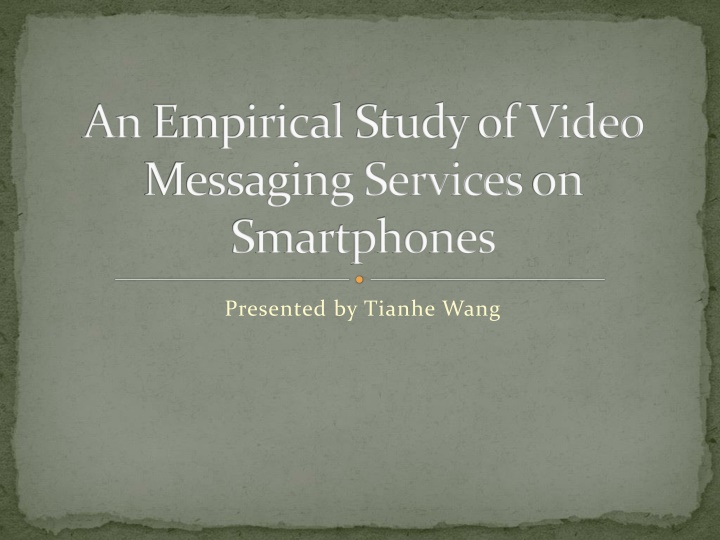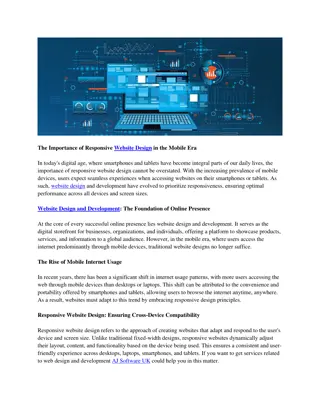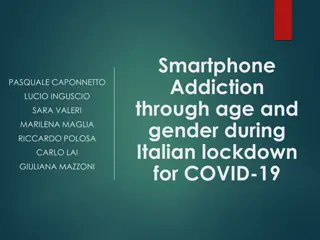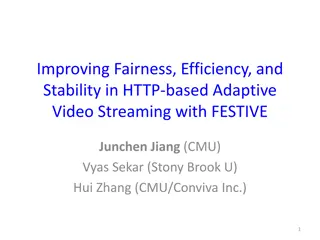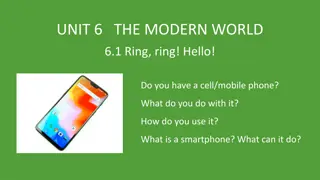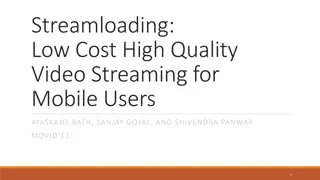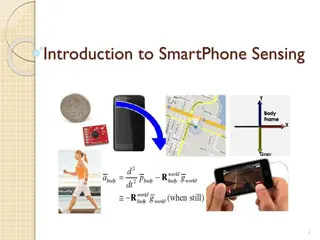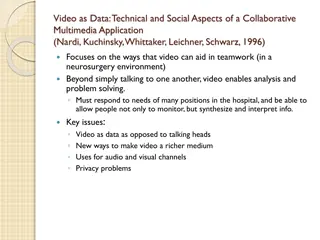Empirical Study of Video Messaging Services on Smartphones
An empirical study on video messaging services on smartphones, focusing on the challenges and architectures of popular platforms like WhatsApp and WeChat. The research explores the mobile application landscape, service architectures, server locations, and methodology used to analyze messaging performance across different smartphone models and operating systems.
Download Presentation

Please find below an Image/Link to download the presentation.
The content on the website is provided AS IS for your information and personal use only. It may not be sold, licensed, or shared on other websites without obtaining consent from the author.If you encounter any issues during the download, it is possible that the publisher has removed the file from their server.
You are allowed to download the files provided on this website for personal or commercial use, subject to the condition that they are used lawfully. All files are the property of their respective owners.
The content on the website is provided AS IS for your information and personal use only. It may not be sold, licensed, or shared on other websites without obtaining consent from the author.
E N D
Presentation Transcript
AnEmpirical Studyof Video Messaging Serviceson Smartphones Presented by Tianhe Wang
BackgroundKnowledge: Client-servermodel
Motivation Mobileapplications: Peoplesend/receive messages using wireless network much more frequently. Multimedia messages are often much larger than text messages Challenging for delivering video messages in real-time.
Service Architecture(1/3) WhatsApp (store-and-forward): Sender: TCP connection with c.whatsapp.net forupdating status and transmission text messages TCP connection with mms.whatsapp.net for uploading multimedia messages Recipient: TCP connection with c.whatsapp.net for receiving text messages TCP connection with mms***.whatsapp.net for receiving multimedia messages
Service Architecture(2/3) WeChat(store-and-forward): Setting up two TCP connections: Short.weixin.qq.com for transmitting periodic heartbeat messages and client-side statistics to WeChatserver Long.weixin.qq.com for sending/receiving both text messages and multimedia messages Periodic Heartbeat: Let receiverknow if thesender is no longeravailable
ServerLocation(1/2): Identify the physical locations of the servers using IP Locator . IP locator, www.ip-adress.com/ip_tracer/ :A reliable IP Address Location Database WhatsApp: Dallas, Texas, USA WeChat: Shanghai, China
Server Location(2/2): (Elastic Compute Cloud)EC2 instanceateach Amazon AWS AWS: Amazon Web Service: Offers reliable, scalable and inexpensivecloud computing services.
Methodology(1/2):settingup Using 6 smartphones: iPhone 4S (iOS 6.0.1), iPhone 3GS (iOS 5.0.1), Galaxy S III (Android 4.0.4), Nexus One (Android 2.3.4), Nokia Lumia 920 (Windows Phone 8), and Meizu MX (Android 4.0). WeChat/WhatsAppversions
Methodology(2/2):Process Upload time for sender Notification Latency Download time for receiver Wireshark tocaptureand analyze the captured traffic file offline. Wireshark: a network protocol Analyzer for Unix and Windows
Upload time(1/5): Record from the first packet being transmitted to the lastTCP ACK from the serverarrives. Device: Andoid 4.0.xdevice: Galaxy S III in the USA MX in China
Upload time(2/5): Result: Bandwidth issue? TCP congestion control TCP window size at server-side? 150KByte/s 2.8KByte/s
Upload time(3/5): WeChat: small TCP window size for each such connection beneficial for supporting text messages or photo messages where the message size is relatively small. WhatsApp: single connection with a single server for all messages Separating video messages from text messages give the WhatsAppserver more chances for optimization without sacrificing the user experience.
Upload time(4/5): File size of video messagesaffects uploading time WhatsApp: IOS: Around 800 Kbps Andoid: Around 2400 Kbps
Upload time(5/5): File size of video messagesaffects uploading time WeChat: IOS: Around 800 Kbps Andoid: Around 160 Kbps
Notification Latency: The sever will send a notification message to the recipient. From when the last uploading packet is sent out by the sending device to when the notification message arrives at the receiving device. WhatsApp in USA, WeChat in China
Download time(1/2): Video Messages are sent from iOS devicesvia both WeChatand WhatsAppseparately. Received by Galaxy S III in the USA, MX in China Message: around 2MB, 20-secs Clients in different locations can experience significantly different downloading throughput.
Download time(2/2): Sent from different devices Both WhatsAppand WeChatclientare in the USA Video messages size
Summary: Two main factorsaffect transmission speed: File size Client/server location Improvements? Reduce file sizewhen uploading/downloading content Set up servers at different data centers in the cloud all over the world
Improvement(1/5): Client-side transcoding: Record high qualityvideo but transmit low qualityvideo messages if only limited bandwidth is available. Powerful hardware forsmartphone to do computation intensive transcoding tasks. Using ffmpeg on Nexus 4: across-platform solution to record, convert and stream audio and video.
Improvement(2/5): Client-side transcoding: Resolution: 1920 1080 to 480 270 Bit rate: 12,000 to 430 kbps 96% reduction Used in urgent message, reduce sending time
Improvement(3/5): Server-side transcoding: Record high qualityvideo but transmit low qualityvideo messages Server: Amazon Elastic Transcoder: allows users to utilize cloud resources including Amazon Elastic Compute Cloud (EC2) and Amazon Simple Storage Service (S3) in an easy way for transcoding video content between different codecs, formats, and sizes
Improvement(4/5): Server-side transcoding: Resolution: 1920 1080 to 480 270 Bit rate: 12,000 to 720 kbps 94% reduction Not desirable
Improvement(5/5): Cloud-assisted Video Message Delivery Location awareness Set up servers at different data centers in the cloud all over the world leverage the inter-datacenter bandwidth Existing research: Airlift [9]
Relatedwork Short Message Service (SMS): bulk messagedelivery maycause network congestion [12] Signaling load fordelivering SMS messages [13] Message security forWhatsApp [14] Watching streamvideos online: how toaddress heterogeneity problem by leveraging server-side resource for transcoding [10, 11]
Conclusion: Larger numberof users make it even moredifficult Existing video messaging services lack adequate network support. Enhancement on readily-available techniques
End Thanks
